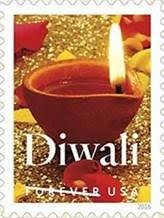America
Rep. Tulsi Gabbard Celebrates USPS Issuance of New Diwali Stamp

Honolulu, HI—Rep. Tulsi Gabbard released the statement below after the U.S. Postal Service announced they will commemorate the festival of Diwali with a Forever stamp. A first-day-of-issue dedication ceremony will take place on Wednesday, October 5, 2016 at the Consulate General of India in New York City.
"Every year, millions of people around the world gather to celebrate Diwali, the beautiful Festival of Lights, a time to reflect upon the victory of light over darkness, truth over untruth, righteousness over wrong. Diwali honors self-awareness, righteousness, and service to others before self—values that transcend different religions, backgrounds, and differences. This act by the U.S. Postal Service to recognize this special day is momentous and will further increase and enrich our nation's tapestry of religious and cultural diversity.â€
In February 2013, the congresswoman cosponsored House Resolution 47 calling for the U.S. Postal Service (USPS) to establish a postage stamp commemorating Diwali and has worked with community leaders around the effort, gathering more than 12,500 petition signatures in support of the stamp this year.
The Diwali stamp is being issued as a Forever stamp. The stamp design is a photograph featuring a traditional diya oil lamp beautifully lit, sitting on a sparkling gold background. Diya lamps are usually made from clay with cotton wicks dipped in a clarified butter known as “ghee†or in vegetable oils.
USPS receives approximately 40,000 suggestions for stamp ideas annually from the public, and approximately twenty-five topic suggestions for commemorative stamps are selected by the Citizens’ Stamp Advisory Committee each year for the Postmaster General’s approval.
Background: Diwali is observed by Hindus, Christians, Jains, Sikhs, and Buddhists in the United States, India, and around the world. Also known as Deepavali, Diwali celebrates the triumph of good over evil. Spanning five days each autumn, it is considered by some to be the start of the new year. On the Hindu calendar, Diwali falls on the eve of, or on, the new moon that occurs between mid-October and mid-November.







































